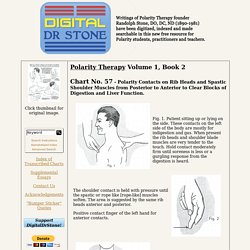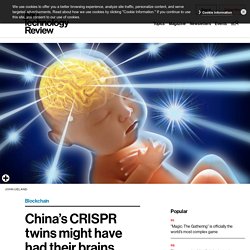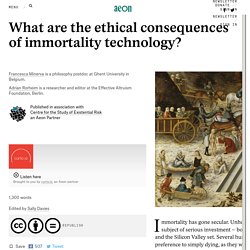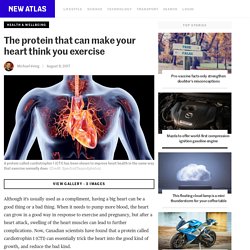

The Digital Dr. Stone - Index of Charts and Texts. Index of Transcribed Charts Supplemental Essays Contact Us Acknowledgements "Bumper Sticker" Quotes Support DigitalDrStone!

Winner of the APTA "Outstanding Service Award" 2012. Polarity Therapy Volume 1, Book 2, Chart 57. Click thumbnail for original image.

Index of Transcribed Charts Supplemental Essays Contact Us Acknowledgements "Bumper Sticker" Quotes Support DigitalDrStone! Winner of the APTA "Outstanding Service Award" 2012. What's My Best Chance of Living Forever? Dezeen. Facty. 10 Signs You Could Have a Magnesium Deficiency - Facty Health. Brain Project Comparison. Protein Intake For Seniors: How To Prevent Sarcopenia - Longevity LIVE. The Effect of 40-Hz Light Therapy on Amyloid Load in Patients with Prodromal and Clinical Alzheimer’s Disease. New Research: Bone Marrow Transplants Might Prevent Aging.
China’s CRISPR twins might have had their brains inadvertently enhanced. The brains of two genetically edited girls born in China last year may have been changed in ways that enhance cognition and memory, scientists say.

The twins, called Lulu and Nana, reportedly had their genes modified before birth by a Chinese scientific team using the new editing tool CRISPR. The goal was to make the girls immune to infection by HIV, the virus that causes AIDS. Now, new research shows that the same alteration introduced into the girls’ DNA, deletion of a gene called CCR5, not only makes mice smarter but also improves human brain recovery after stroke, and could be linked to greater success in school.
“The answer is likely yes, it did affect their brains,” says Alcino J. Silva, a neurobiologist at the University of California, Los Angeles, whose lab uncovered a major new role for the CCR5 gene in memory and the brain’s ability to form new connections. The experiment has been widely condemned as irresponsible, and He is under investigation in China. The flavonoid 4,4â²-dimethoxychalcone promotes autophagy-dependent longevity across species.
Japanese plant eaten by Samurai may hold key to slowing down ageing. Anti-aging effects of compound in some fruits and vegetables verified in novel new research. New experimental drug rapidly repairs age-related memory loss and improves mood. Breathing Exercises to Increase Oxygen Rate. Topic: Microcosmic orbit – how to approach and what to expect. Oil of the Christ. What are the ethical consequences of immortality technology? Detail from The Fountain of Youth (1546) by Lucas Cranach the Elder.

Courtesy Wikipedia Immortality has gone secular. Unhooked from the realm of gods and angels, it’s now the subject of serious investment – both intellectual and financial – by philosophers, scientists and the Silicon Valley set. Several hundred people have already chosen to be ‘cryopreserved’ in preference to simply dying, as they wait for science to catch up and give them a second shot at life. But if we treat death as a problem, what are the ethical implications of the highly speculative ‘solutions’ being mooted?
Of course, we don’t currently have the means of achieving human immortality, nor is it clear that we ever will. Like a futuristic fountain of youth, rejuvenation promises to remove and reverse the damage of ageing at the cellular level. Sign up for Aeon’s Newsletter Rejuvenation seems like a fairly low-risk solution, since it essentially extends and improves your body’s inherent ability to take care of itself. The protein that can make your heart think you exercise. Although it's usually used as a compliment, having a big heart can be a good thing or a bad thing.

When it needs to pump more blood, the heart can grow in a good way in response to exercise and pregnancy, but after a heart attack, swelling of the heart muscles can lead to further complications. Now, Canadian scientists have found that a protein called cardiotrophin 1 (CT1) can essentially trick the heart into the good kind of growth, and reduce the bad kind. Heart failure is a life-threatening condition where the organ can't adequately pump blood around the body, and often the only treatment is a transplant. It can be caused by a heart attack that damages muscles in the left side of the organ, or by pulmonary hypertension, whereby high blood pressure in the lungs damages the right side. The results showed that heart muscle cells treated with CT1 grew more blood vessels, formed longer, healthier fibers, and could pump blood better. The study was published in the journal Cell Research.
New device can heal with a single touch, and even repair brain injuries. Why Do We Die?